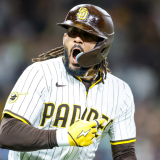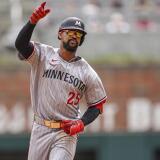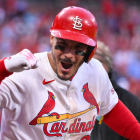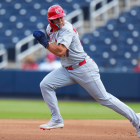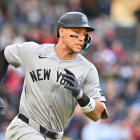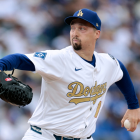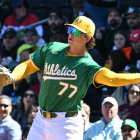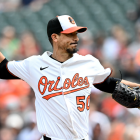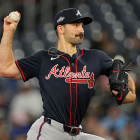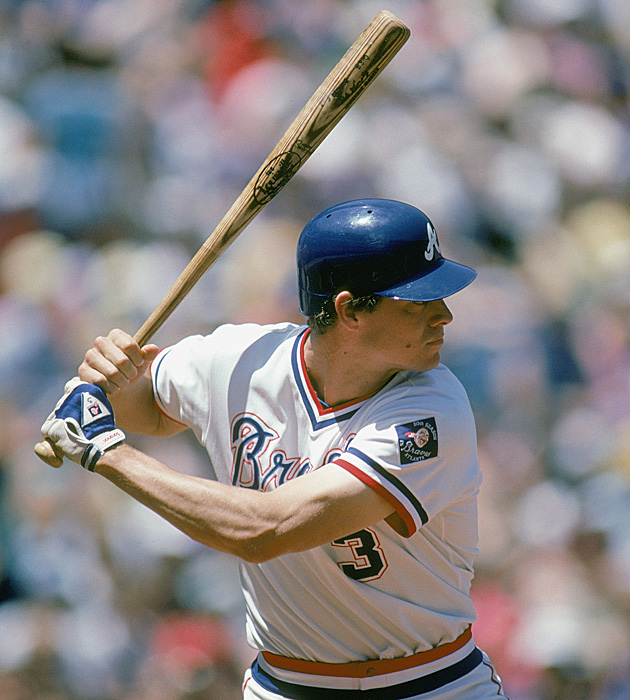 |
| Was Murphy's excellent prime enough to get him into Cooperstown this year? (Getty Images) |
As we move forward in ranking the 37 Hall of Fame candidates on this season's both crowded and polarizing ballot, we are now starting to get into the thick of the serious candidates.
As has been previously mentioned, these rankings have been compiled by an average ranking of the three Eye on Baseball bloggers.
Our entry at No. 14 is a true gentleman of the game and one of only six National League players to win back-to-back MVP awards.
| Baseball Hall of Fame |
| Related coverage |
|
14. Dale Murphy; OF; Braves, Phillies, Rockies; 1976-1993
Year on ballot: 15th (14.5 percent of ballots in 2012)
bWAR, rank among candidates: 42.6, 18
JAWS, rank among candidates: 40.8, 16
There's no question Murphy was a great baseball player. He was a two-time NL MVP, a seven-time All-Star, five-time Gold Glove winner and four-time Silver Slugger winner. But do his career numbers hold up as a Hall of Fame case?
Murphy hit .265/.346/.469 in his career with 398 homers, 1,266 RBI, 1,197 runs, 2,111 hits, 350 doubles and 161 stolen bases. So he didn't really compile well, ranking 53rd in career homers, 123rd in RBI, 174th in runs and 213th in hits. This was due to a pretty sharp post-prime decline after an outstanding early career, which really complicates matters.
There's very little doubt that Murphy was one of baseball's elite players from 1982-87. During that span, he averaged 36 homers, 105 RBI, 110 runs and 18 stolen bases per season with a .289/.382/.531 triple slash line that was good enough for a 145 OPS-plus. During this six-year stretch, Murphy won two MVPs and finished in the top 10 of MVP voting four times.
In all, Murphy went over 30 homers six times, 100 RBI five times and 100 runs four times.
After this stretch, however, Murphy began to make a rather large amount of outs. For the rest of his career, he only hit .234/.307/.396. This decline began in his age-32 season, too.
So once Murphy turned 32, he never again reached an All-Star Game or won a Gold Glove or Silver Slugger. The only offensive category in which he led the league was grounding into double plays (twice). He was essentially a sub-par player the rest of the way.
So what we're looking at is a player who was absolutely headed to the Hall of Fame through his age-31 season but was barely better than a replacement player the rest of his career. It's kind of eerie to think about the fact that this happened with another Braves center fielder recently, though it happened to Andruw Jones when he was a bit younger (not coincidentally, Murphy's top match in baseball-reference.com similarity scores is Jones).
Where it gets especially tough on Murphy's case is the Integrity Clause. If we remember, this is taken explicitly from the voting instructions for BBWAA members:
Voting shall be based upon the player's record, playing ability, integrity, sportsmanship, character, and contributions to the team(s) on which the player played.
So here's food for thought: If we are going to punish players whom we believe did not play with integrity, sportsmanship and character, shouldn't we reward players who displayed outstanding integrity, sportsmanship and character throughout their career with bonus points? An argument could be made here. By all accounts of those who covered Murphy during his playing days, he qualifies as a man of exceptional integrity, sportsmanship and character.
Also, do we want to give Murphy credit for his durability while allowing for the possibility that it factored heavily into his quick, sharp decline? He played 156 games in 1980, 104 of the 106 games in a strike-shortened 1981 season and then played all 162 games in each of the next four seasons. He then played at least 153 games per season through 1991.
Even further complicating matters here are several of Murphy's peers on this Hall of Fame ballot and their connection to PEDs. Couldn't an argument be made that had Murphy decided to use steroids -- and Jose Canseco was already admittedly well into juicing during Murphy's decline -- that his prime could have been extended a few years, thus easily giving his resume the extra boost needed to gain enshrinement into Cooperstown?
It's a very tough decision when taking every factor into consideration. I'm straddling the fence here but feel like Murphy should stay on the outside looking in -- by the slimmest of margins.
Would we vote for him? Snyder: No (13); Rosecrans: No (13); Perry: No (13)
For more baseball news, rumors and analysis, follow @EyeOnBaseball on Twitter, subscribe to the RSS feed and "like" us on Facebook.
![[object Object] Logo](https://sportshub.cbsistatic.com/i/2020/04/22/e9ceb731-8b3f-4c60-98fe-090ab66a2997/screen-shot-2020-04-22-at-11-04-56-am.png)


